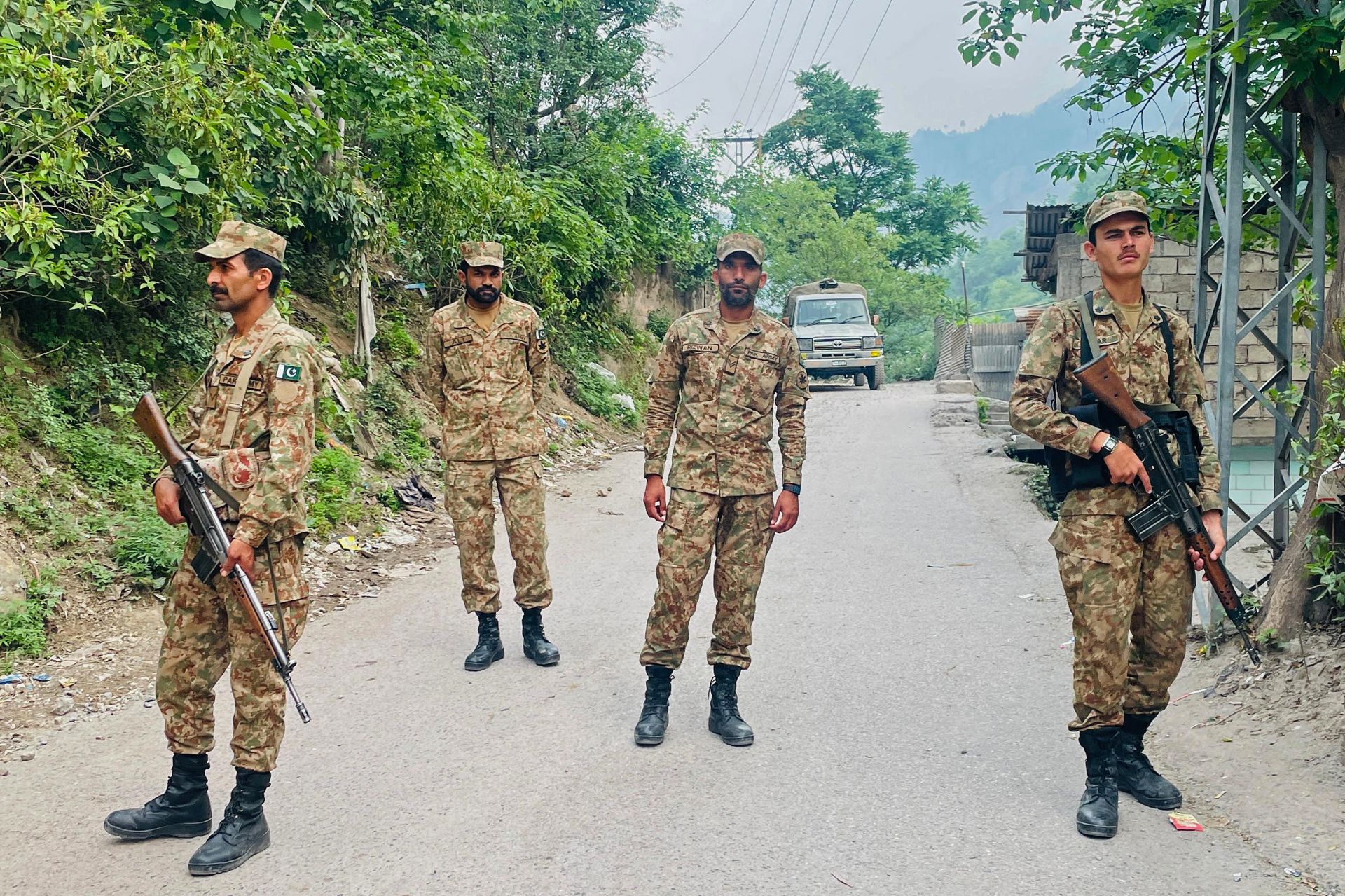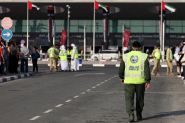- Home
- Middle East
- India and Pakistan Exchange Fire After Deadly Escalation

Soldiers stand guard near the site of a damaged mosque, a day after Indian strikes in Muzaffarabad, the capital of Pakistan-administered Kashmir, on May 8, 2025. ©Sajjad Qayyum / AFP
Indian and Pakistani soldiers exchanged gunfire overnight in Kashmir, New Delhi said Thursday, a day after the worst violence between the nuclear-armed rivals in two decades.
Pakistani Prime Minister Shehbaz Sharif vowed to retaliate after India launched deadly missile strikes on Wednesday morning, with days of repeated gunfire along their border escalating into artillery shelling.
"We will avenge each drop of the blood of these martyrs," Sharif said in an address to the nation.
India said it had destroyed nine "terrorist camps" in Pakistan in "focused, measured, and non-escalatory" strikes two weeks after New Delhi blamed Islamabad for backing an attack on tourists in the Indian-administered side of disputed Kashmir – a charge Pakistan denies.
At least 45 deaths have been reported from both sides of the border following Wednesday's violence, including children.
Islamabad said 31 civilians were killed by Indian strikes and firing along the border.
New Delhi said 13 civilians and a soldier had been killed by Pakistani fire.
Pakistan's military also said five Indian jets had been downed across the border, but New Delhi has not responded to the claims.
An Indian senior security source, who asked not to be named, said three of its fighter jets had crashed on home territory.
“Screamed”
The largest Indian strike was on an Islamic seminary near the Punjabi city of Bahawalpur, killing 13 people, according to the Pakistani military.
Madasar Choudhary, 29, described how his sister saw two children killed in Poonch, on the Indian side of the frontier, on Wednesday.
"She saw two children running out of her neighbor's house and screamed for them to get back inside," Choudhary said, narrating her account because she was too shocked to speak.
"But shrapnel got to the children -- and they eventually died."
Muhammad Riaz said he and his family had been made homeless after Indian strikes hit Muzaffarabad, the main city of Pakistan-administered Kashmir.
"There is no place to live," he said. "There is no space at the house of our relatives. We are very upset; we have nowhere to go."
On Wednesday night, Pakistani military spokesman Ahmed Sharif Chaudhry reported firing across the Line of Control – the de facto border in Kashmir -- and said that the armed forces had been authorized to "respond in self-defense" at a "time, place, and manner of its choosing."
India's army on Thursday morning reported firing "small arms and artillery guns" in multiple sites overnight, adding that its soldiers had "responded proportionately", without giving further details.
India and Pakistan have fought multiple times since the violent end of British rule in 1947, when colonial officers drew straight-line borders on maps to partition the nations, dividing communities.
Muslim-majority Kashmir – claimed by both India and Pakistan – has been a repeated flashpoint.
“No Pushover”
India's Defense Minister Rajnath Singh said the operation was New Delhi's "right to respond" following an attack on tourists in Pahalgam in Kashmir last month, when gunmen killed 26 people, mainly Hindu men.
New Delhi blamed the Pakistan-based group Lashkar-e-Taiba – a UN-designated terrorist organization – and the nations traded days of threats and diplomatic measures.
India on Thursday braced for Pakistan's threatened retaliation.
"Border districts on high alert," The Hindu newspaper headline read, adding that "India must be prepared for escalatory action" by Pakistan.
In an editorial, the Indian Express wrote, "there is no reason to believe that the Pakistan Army has been chastened by the Indian airstrikes," adding that Indian military experts were "aware that Pakistan's armed forces are no pushover."
Diplomats and world leaders have pressured both countries to step back from the brink.
"I want to see them stop," US President Donald Trump said Wednesday.
Iranian Foreign Minister Abbas Araghchi is slated to meet his Indian counterpart Subrahmanyam Jaishankar on Thursday in New Delhi, days after visiting Pakistan, as Tehran seeks to mediate.
Analysts said they were fully expecting Pakistani military action to "save face" in response to India.
"India's limited objectives are met," said Happymon Jacob, director of the New Delhi-based think tank Council for Strategic and Defense Research.
"Pakistan has a limited objective of ensuring that it carries out a retaliatory strike to save face domestically and internationally. So, that is likely to happen."
Based on past conflicts, he believed it would "likely end in a few iterations of exchange of long-range gunfire or missiles into each other's territory."
AFP
Read more



Comments